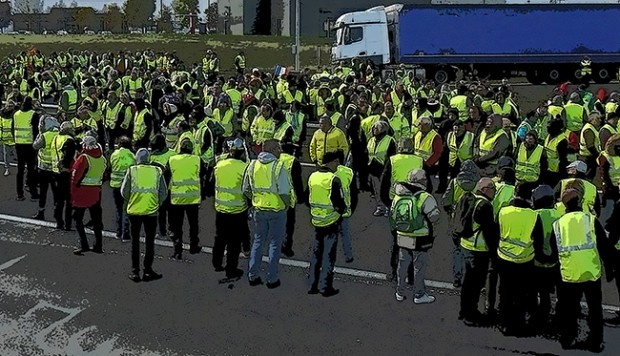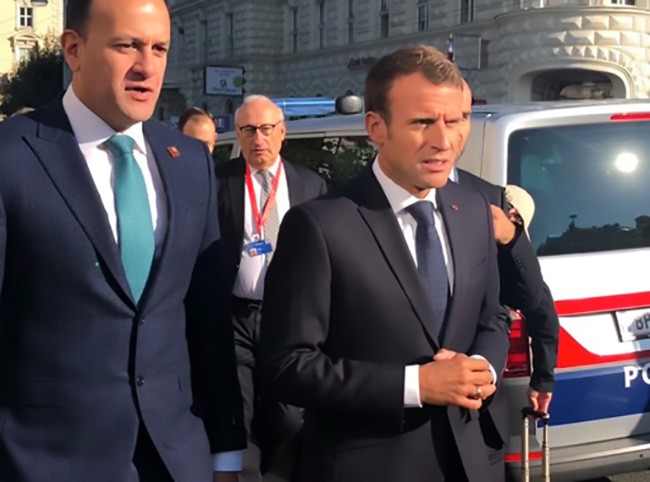1 March 2019 Edition
‘Our eyes are open and we won’t kneel down’
The yellow vest movement explained

After the blue shirt of its football team this summer, it is now because of the ‘yellow vests’ of its people that France is at the centre of media attention in the world. The “gilets jaunes” movement has come as a largely unexpected and unprecedented social explosion, that has forced President Emmanuel Macron to back down for the first time since taking office in 2017.
Born on social media after the announcement by the government of an increase in fuel taxes, it rapidly spread to the whole country, gathering together people from the working classes (blue-collar and employees) and middle strata (small shopkeepers, artisans).
Highly suspicious, or even hostile to political parties and unions, and without national leaders or organisation, the “gilets jaunes”, many of whom had never participated in collective actions before, conducted a wide array of actions, from blocking roundabouts in small villages to occupying the Champs Elysées in Paris.
This explosion comes in the midst of a social blitzkrieg lead by Macron, relentlessly attacking the historic conquests of the French people and working class. Public housing, hospitals, transportation have been de-funded in order to prepare for their privatisation. Labour laws have been weakened, wages frozen and tax cuts granted to big businesses, with no effect on unemployment but a deepening of precariousness and a deterioration of working conditions. While the wealthiest households benefited from the removal of the “solidarity tax on fortune” (ISF), pensioners saw an increase in their taxes.
The neoliberal offensive is not new. Between 2008 and 2016, French households suffered from a €440 cut in disposable income. Macron has added insult to injury, repeatedly declaring he would “give nothing to the lazy”, calling his opponents “refractory Gauls”, or distinguishing between “those who succeed and those who are nothing”.
The highly heterogeneous character of the movement is both a strength and a danger. Its social diversity and blurred discourse has allowed it to grow and agglomerate the discontent of many sectors of society.
Despite the ‘violence’ of the protests and the media discourse aimed at de-legitimising it, the ‘gilets jaunes’ still have the support of around 70% of the French population. On the other hand, we should not ignore the racist, islamophobic and anti-migrants actions that have been carried out on some occasions, or the fact that the extreme-right is actively trying to infiltrate and drive the movement.

• Leo Varadkar with French Prime Minister Emmanuel Macron
For progressives forces in France, and especially communists, this poses a great responsibility. At every level, we are actively supporting the mobilisations, explaining the real causes of the situation in the country and promoting our proposals for a different social, economic and political system.
The focus on tax hikes is giving way to one of fiscal and social injustices. The watchword of the reinstatement of the ‘solidarity tax on wealth’ is now central, and the calls for an increase in salaries and pensions and the end of fiscal gifts for the wealthiest are gaining ground.
Alliances and convergences are also developing, broadening the social base of the movement and steering to this progressive direction, from university students protesting against the increase of fees for international learners, to participants at the climate walks joining their green vests to the yellow ones, to unions calling for a national day of action on Friday 14th December.
The most significant sector to have joined the struggle are high-school students. There also, the wave of the ‘gilets jaunes’ has crystallised the discontent and revivified the movement against the establishment of selection for the entry to public universities and the lack of funding.
Across France, hundreds of schools have been blocked by the students. In universities, general assemblies are multiplying and in early December a spontaneous protest gathered 10,000 students in Paris.
The only answer of the government has been contempt and repression. On Saturday 8th alone, 1,723 people were arrested and 624 injured according to official numbers. Armoured vehicles took position in the streets of Paris. In Bordeaux, a young man lost his hand because of an explosive grenade thrown by the police. In Orléans, Grenoble, Garges-lès-Gonesse, high school students received severe head injuries after the police shot rubber balls at them. In Mantes-la-Jolie, the images of a group of teenagers detained on their knees with their hands on their heads have shocked the world.
As days go by, it becomes clearer and clearer that Emmanuel Macron, his government and his MPs are deeply disconnected from the daily life of the French people. After announcing a six-month suspension of the raise in taxes, the government has been forced to withdraw it. This is a crucial victory against a power that had vowed never to yield to popular pressure. But it means no rest for the government and protests have continued, because now the movement is not just against tax rises, but against decades of humiliations, marginalisation and social injustices.
Much remains to be done, as Macron and the rest of the right will try to divert the anger towards “excessive public spending leading to excessive taxes”. But our eyes are open and we won’t kneel down.
Cyril Benoit is the coordinator for international relations at the Mouvement Jeunes Communistes de France (Young Communists of France).



